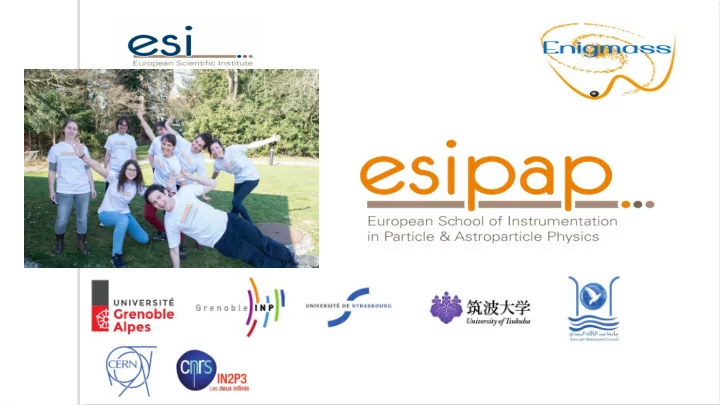

Research in fundamental physics Select a great physics case Design, build and operate an experiment And work 10-20 years ...
Research in fundamental physics Select a great physics case Design, build and operate an experiment And work sometimes even more than 30 years ...
Training / Teaching While theoretical physics might be taught in any place worldwide Training/teaching in instrumentation requires resources and leading experts that are more easily found next to world labs
ESIPAP in a few words THE reference school in HEP instrumentation in the vicinity of CERN, the world agora of the HEP community. Training of the next generation of young physicists who will carry out HL-LHC upgrades, major experimental programs in neutrino physics, astroparticle physics, cosmology, gravitational wave astronomy, and later on new collider projects. Very broad & intensive school with REAL exams : ECTS 2 courses of 4 weeks each, that can be followed entirely or selectively by weeks Selective admission of up to 2 x 16 students per year at international level Open to Master, PhD students and junior professionals
Location Location Archamps Technopole
Home countries (26 in total) of ESIPAP alumni (66 till now)
We just celebrated our 5 th anniversary (Feb 15 th )
Course 1 : Physics of particle and astroparticle detectors Week 2 Jan. 21, 2019 Week 1 Interaction of particles with matter Subatomic physics Stochastic & statistical Cosmology aspects Astroparticle physics Calorimetry Labs at CERN Week 3 Week 4 Tracking Muon detection C++ computing Imaging & Cherenkov Detector simulation detectors Particle identification Labs at CERN Feb. 15, 2019
Course 2 : detector technologies and applications Feb. 28, 2019 Week 1 Week 2 Detector technologies. Trigger & data acquisition. Signal processing & Ultra-cold neutrons. electronics. Data Handling. Gravitational wave Project Management. detection. Labs at CERN. Week 3 Week 4 Composite materials. Magnets for particle detectors. Medical applications. Python, advanced C++ Additive printing. Grid computing. Photon counting imaging. Space projects. Labs in Grenoble Mar. 15, 2019
ESIPAP in pictures
Testimony I was one of the lucky few that participated in the first ESIPAP edition in 2014. I included both modules as part of my master's degree in nuclear engineering from Grenoble-INP PHELMA. At that time I was already aiming to work in detector instrumentation but still unsure whether in the industry or the academy. Being surrounded by experts in their respective field for these two months helped me make my choice. Shortly after finishing the school I got accepted for a PhD position in detector R&D for particle physics. A. Pingault PhD student in Gent The first module provided me with the background necessary to start working in my field. During the second module, I was able to discover and discuss technology and techniques I didn't even hear about before. Some of them I would use in my work afterwards. For this, lab sessions (all at CERN this year) were a major opportunity to get hands-on experience on state of the art technology. The schedule of the school is dense! But, from our fellow international students to the quality of the teaching materials and interesting topics, the environment we are studying in makes it worthwhile. Lecturers are all experts in their respective field. Being able to interact directly with them in such conditions is a rare opportunity. All in all, it was a superb first work experience in such international context. I would gladly urge anyone interested in detector instrumentation to attend the ESIPAP school.
For further information Video of presentation : https://youtu.be/f2ggf4P36cc Contact : esipap@esi-archamps.eu Next session : course 1 , 21 Jan. - 15 Feb. 2019 course 2 , 18 Feb. - 15 Mar. 2019 Registration : www.esipap.eu Twitter : ESIArchamps Facebook : www.facebook.com/ESIArchamps
Recommend
More recommend